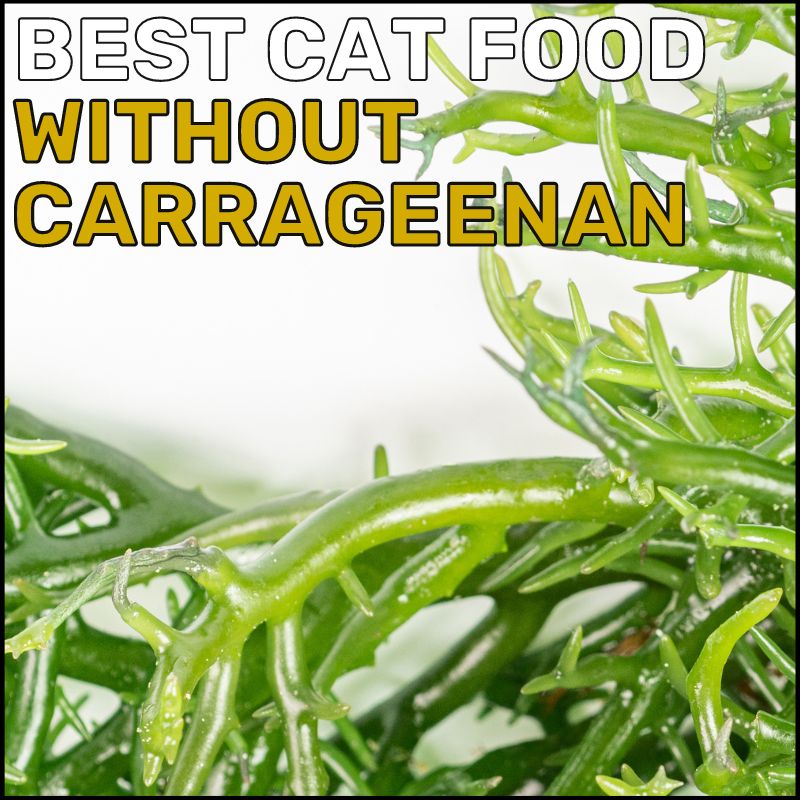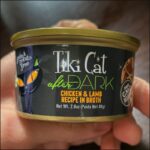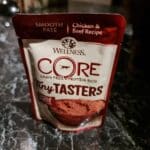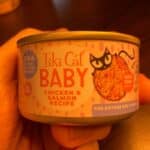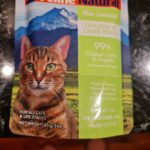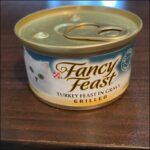Quick answer: Carrageenan is a seaweed thickener used in many wet cat foods. It has no nutrition value.
Linked with irritable bowel syndrome, diarrhea, and inflammatory conditions like arthritis.
5 Best Cat Foods Without Carrageenan
I filtered popular cat foods for carrageenan. All are the best rated from my testing.
All are suitable options but Tiki Cat After Dark is the best quality overall with plenty of variety.
More below in this guide to the best cat food without carrageenan.
I have a background in nutrition and research and test most of the products recommended.
This article isn’t a replacement for medical advice.
See more about us here.
What to Look For in the Cat Food Without Carrageenan?
Quick answers:
- What is carrageenan: Thickener from red seaweed (Irish Moss).
- Used in: Mostly gravy based wet cat foods. Some brands use it more than others.
- Why bad: Linked with inflammatory conditions including colitis, arthritis, irritable bowel disease and colon cancer.
- Is it safe: FDA regards it as generally safe in small amounts.
- How to know it’s in cat food: Check ingredients list for carrageenan and other names like E407, Irish moss, algin, gelling agent, seaweed extract and chondrus.
Long answers:
What is Carrageenan?
Carrageenan is a thickener.
It’s mainly used in wet cat foods (usually gravy based). You won’t usually find carrageenan in dry cat food, because it’s a thickener.
Carrageenan is made from red seaweed products (also called Irish Moss). Whilst it’s technically ‘natural’, it’s still linked with harm.
Carrageenan in Cat Food
Carrageenan is found in many wet cat foods.
The reason is to thicken cat food for a desirable texture. Gravy and pate based cat foods tend to use carrageenan more often.
Some brands tend to use carrageenan more often than others. For example, Blue Buffalo use carrageenan a lot, whilst Hill’s Science Diet don’t seem to use it.
Why Is Carrageenan Bad for Cats?
Degraded carrageenan may cause inflammatory conditions including:
- Colitis
- Arthritis
- Irritable bowel disease
- Colon cancer
Some carrageenan degrades with digestion. Degraded carrageenan is used to test models of inflammation.
The amount of carrageenan used to cause digestive disorders is much higher than found in cat food (less than 1%). Carrageenan is generally regarded as safe (GRAS) by the FDA.
Tolerance studies exist for rats and dogs, but none for cats. A safety panel suggest 750mg/kg wet feed is safe for cats (extrapolated from dog safety research).
Problem?
You won’t get information on how much carrageenan is in your cat food. Although it’s likely very small, the grey area is a problem.
How to Identify Carrageenan in Cat Food?
Here’s how to find out if carrageenan is in your cat food.
Check the Ingredients List
By law, cat food has to include an ingredients list. It’s usually on the back or side.
As carrageenan is a minor ingredient, it will usually be down the list so check carefully.
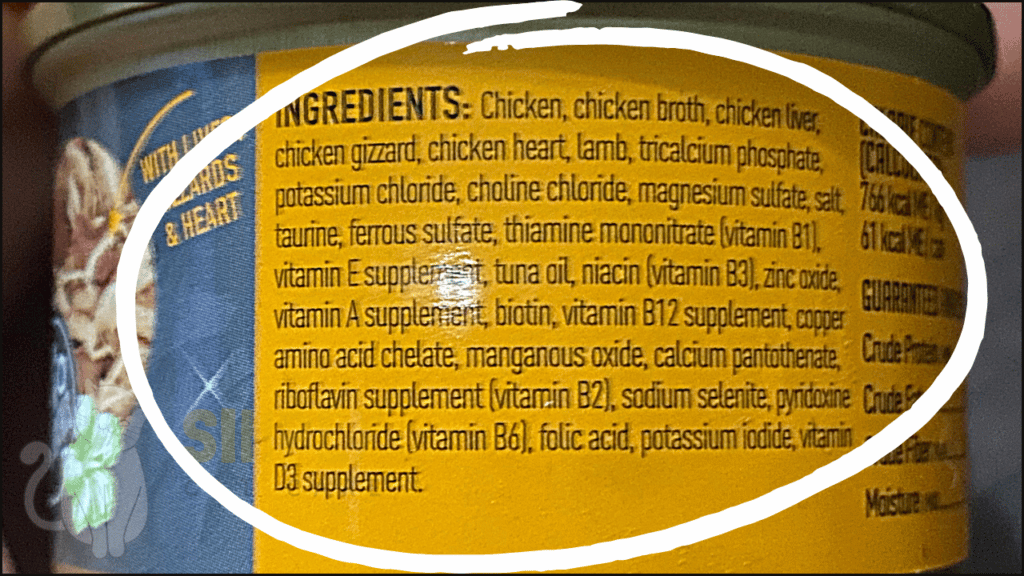
Check Ingredients Online
Buying online?
Some retailers don’t put out ingredients list, but others do.
Hit control + F (command + F for mac users) to see if there’s any carrageenan in your chosen food. Make sure you get the spelling right.
Here’s an example on Chewy:
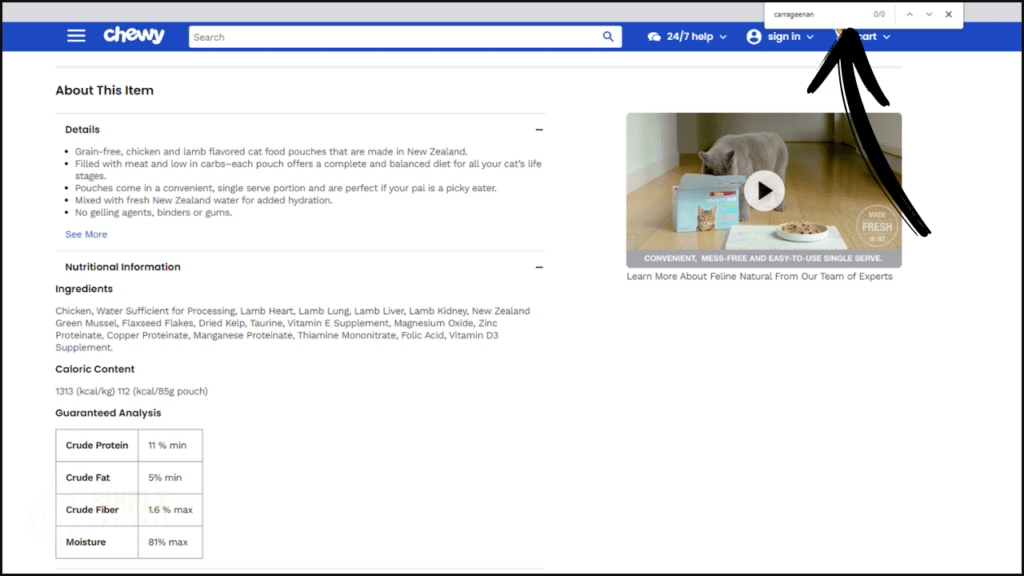
Check Other Names for Carrageenan in Cat Food
Some countries use numbers for additives, including carrageenan. In Australia, for instance, carrageenan is E407.
Words like ‘gelling agents’ or ‘stabilizer’ can include gums and carrageenan. If you see these terms, it’s best to stay on the safe side.
Here’s a longer list of names for carrageenan to watch for:
- E407
- Irish moss
- Algin
- Seaweed extract
- Polysaccharide
- Red seaweed extract
- Carrageenan gum
- Chondrus
- Carrageenin
- Thickeners
- Gelling agents
- Vegetable gum
Resources:
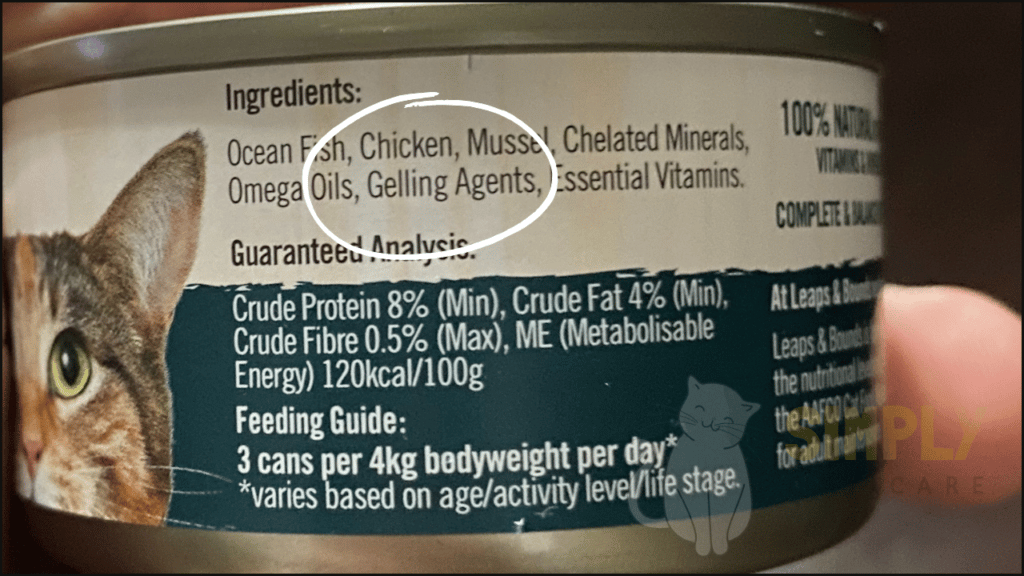
How to Find the Best Cat Food Without Carrageenan?
Make sure you choose cat food that meets your cats dietary needs. Check for a statement of nutritional adequacy on the label.
This shows your cat food meets AAFCO’s nutrition guidelines for:
- Growth: Kittens (up to 1 years)
- Maintenance: Adult cats (1-7 years)
- All life stages: Kittens or adults
- Supplemental: Occasional feeding only (not complete)
AAFCO don’t set nutrition guidelines for senior cats. Find guidelines at American Association of Feline Practitioners (AAFP) website.
Most cat foods suitable for all life stages are better choices for older cats.
Choose High Protein Cat Food
Protein is the most important nutrient for cats and their preferred food source as carnivores.
The nutrient is high in animal foods like chicken, fish, turkey, and beef. You’ll want to make sure you choose foods high in these ingredients.
Grain-based protein (e.g. wheat gluten) is lower quality. This type of protein has fewer essential amino acids, which are what cats need to use to fuel muscle strength.
As a general rule, aim for 40% protein on a dry basis. Use a calculator to check.
Learn more:

Can Carrageenan Be Avoided in Cat Food?
Yes, you can avoid carrageenan in cat food.
Whilst the thickener is widely used there’s enough options to choose from that are carrageenan free.
Remember, that dry cat food doesn’t contain carrageenan, so that’s fine to use.
Which Cat Foods Use Carrageenan?
From my research:
- Dave’s Pet Food Naturally Healthy
- Fussie Cat Premium
- Friskies
- Merrick Purrfect Bistro
- 9 Lives Hearty Cuts
- Blue Buffalo Freedom
- Natural Balance
- Royal Canin Kitten
This list isn’t exhaustive and only includes cat foods I’ve research and/or tested.
It may not reflect all products from the brand or future changes.
What Cat Food Does Not Have Carrageenan in It?
Based on my research, the following cat food doesn’t have carrageenan:
- Tiki Cat After Dark
- Ziwi Peak
- Feline Natural
- Fancy Feast Classic
- Wellness Core
- Hill’s Science Diet
- Sheba Perfect Portions
- Purina Pro Plan
- Purina One
- Tiny Tiger
- Hound & Gatos
FAQ
Quick answers:
- Is carrageenan only found in canned cat food? Yes, it’s commonly used as a thickener in canned cat food.
- Does Whiskas cat food contain carrageenan? Most likely, since it contains ‘gelling agents’ which may include carrageenan.
- Is carrageenan present in Royal Canin cat food? Yes, it’s found in products like Royal Canin Kitten, Adult Instinctive, and Indoor.
- How safe is carrageenan in cat food? Its safety is not well established. While the FDA considers it generally safe in small amounts, there’s no direct research on its effects in cats.
- What are the side effects of carrageenan in cats? Degraded carrageenan is linked to conditions like colitis, arthritis, irritable bowel disease, and colon cancer.
- Does Purina Pro Plan contain carrageenan? Generally, no. However, the Friskies line, which is part of Purina, does contain carrageenan.
- How can you avoid carrageenan in cat food? By carefully checking the ingredients list and being cautious about vague terms like ‘vegetable gum’ or ‘gelling agents’.
- Does chicken contain carrageenan? No, chicken itself does not contain carrageenan.
- Is carrageenan banned in Australia? No, it is still legal to use in Australia (check for gelling agents or E407).
- Which milks contain carrageenan? Many processed milks, especially “kitten milk” products, contain carrageenan.
- Why is carrageenan used so widely? It’s a thickener that prevents food from being runny, used in many human and pet foods, as well as in other products like toothpaste and shampoo.
- Does Hill’s Science Diet cat food have carrageenan? No, carrageenan isn’t found in the Hill’s Science Diet range to my knowledge.
- Does Sheba cat food contain carrageenan? No, Carrageenan is not present in Sheba wet cat foods to my knowledge.
Long answers:
Is Carrageenan Only in Canned Cat Food?
Yes.
Carrageenan is a thickener that is used in sauces and liquid foods to create a more desirable texture that’s less runny.
Does Whiskas Have Carrageenan?
Most likely.
Whiskas contains ‘gelling agents’, which may contain carrageenan.
It’s a cheaper cat food (most have carrageenan). A location specific brand, so double check.
Does Royal Canin Cat Food Have Carrageenan?
Yes.
Products with carrageenan:
- Royal Canin Kitten
- Royal Canin Adult Instinctive
- Royal Canin Indoor
Another location specific brand, so double check where you live.
Is Carrageenan Safe in Cat Food?
It’s not well known whether carrageenan is truly safe in cat food.
The amount of carrageenan used to cause digestive disorders is much higher than found in cat food (less than 1%). Carrageenan is generally regarded as safe (GRAS) by the FDA.
Tolerance studies exist for rats and dogs, but none for cats. A safety panel suggest 750mg/kg wet feed is safe for cats (extrapolated from dog safety research).
However, there is no direct research into cat food.
What Are the Side Effects of Carrageenan in Cats?
Degraded carrageenan is linked with inflammatory conditions including:
- Colitis
- Arthritis
- Irritable bowel disease
- Colon cancer
Is Carrageenan in Purina Pro Plan?
No, it doesn’t appear so.
Carrageenan isn’t in the following Purina Pro Plan products:
- Purina Pro Plan Senior Adult 7+ Seafood Favorites Pate Variety Pack Canned Cat Food
- Purina Pro Plan Chicken & Turkey Favorites Variety Pack Canned Cat Food
- Purina Pro Plan Adult White Meat Chicken & Vegetable Entree in Gravy Canned Cat Food
- Purina Pro Plan Adult Seafood Stew Entree in Sauce Canned Cat Food
- Purina Pro Plan Focus Adult 11+ Classic Salmon & Tuna Entree Canned Cat Food
Please check each product as future product mixes may change.
Purina have one line of cat food that does contain carrageenan, which is Friskies.
Does Friskies Have Carrageenan?
Yes, I have found carrageenan in Friskies wet canned cat food.
Friskies products with carrageenan:
- Friskies Pate (all flavors)
- Friskies Farm Favorites
Friskies Shreds is carrageenan free as of the writing of this article.
How Can You Avoid Carrageenan?
The best way to avoid carrageenan is to check the ingredients list carefully.
If you’re unsure about an ingredient, check online to see if it may contain carrageenan. In some cases it’s best to err on the side of caution with vague ingredients (e.g. vegetable gum, gelling agents).
Does Chicken Have Carrageenan?
No, chicken doesn’t have carrageenan.
Is Carrageenan Banned in Australia?
No, carrageenan is still legal to use in Australia.
What Milks Have Carrageenan?
A lot of processed milks have carrageenan.
Many “kitten milk” products contain carrageenan and other vegetable gums. This gives consumers an attractive looking texture.
Why Is Carrageenan in Everything?
Carrageenan is a thickener that stops food from being runny and watery. It’s used in a lot of human products including milkshake and ice-cream.
It’s even used for other purposes including toothpaste and shampoo. Gravy based and pate cat food often uses it to help get a desirable texture.
Does Hill’s Science Diet Have Carrageenan?
Apparently not.
I went through a range of Hill’s Science Diet and Prescription Diet cat foods. None had carrageenan.
This doesn’t guarantee every single product is carrageenan free. Always double check.
Does Sheba Cat Food Contain Carrageenan?
No.
I’ve checked a range of Sheba wet cat foods, and none contained carrageen.
Includes Perfect Portions Pate, Cuts in Gravy and Bistro.
Conclusion
Carrageenan is a thickener used in wet cat food linked to cancer and irritable bowel disease.
Whether the small amount is harmful isn’t clear, but avoiding it is good for peace of mind.
Dry cat food doesn’t contain carrageenan, but it’s common in gravy based wet foods. Check the ingredients carefully.
Comparison of our top 3 picks:

